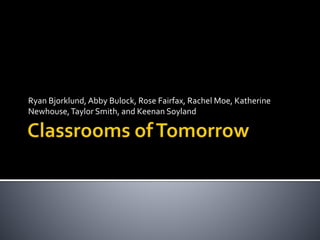
Classrooms of Tomorrow in High School
- 1. Ryan Bjorklund, Abby Bulock, Rose Fairfax, Rachel Moe, Katherine Newhouse,Taylor Smith, and Keenan Soyland
- 2. What kinds of changes will be made for future classrooms? How will these changes effect education for future students and teachers? Will these changes create new challenges for education? What are these new challenges that may happen in the future for education?
- 3. Content- Switch from primarily chronological events to progressive, social, and economic benefits with some chronological events. For example: Climate change and its past as well as dealing with it; know court cases and how students can use those in their own financial and legal lives; or learning ancient Greece not from battle to battle or event to event, but the ideas like democracy, republic and oligarchy relating to how that impacts the U.S. and theWestern world today.
- 4. Technology-Visual stimulation, but no drastic changes. Effects-Teacher will teach based on students interests as well as focusing on how history effects them and how knowing this benefits their daily lives or could benefit their lives because there is to much history and growing it will now focus on applying history to the present or increase the need to history positions.
- 5. Challenges- Standards on what is important and what is not, creating history teacher that can engage in social discussion and guide this type of classroom. History has been pushed aside in recent years to focus on more “learn things just to develop” as well as been divided out to non-history teachers in order to save money. It will however regain notoriety as standards of education are on the verge of shifting or reforming once again in the direction of a more individual social student based system, where they focus on preparing for real life and the real world, and in turn they will also need to teach more history courses to cover the vast content and connect it to individuals and society.
- 6. Math is a very technophobic content area.We do the same math that was laid out hundreds and hundreds of years ago and it's still easiest to write out an equation by hand than it is to type one into a program. (Same goes for science) Even calculators throw students for a loop because of how literal they can be in interpreting your input (forget one little parenthesis and you get an entirely wrong answer!).
- 7. Until someone comes up with some way to easily type equations into a keyboard (e.g., an intuitive software, a math-specific keyboard, etc.) then I really think math is going to stay away from a lot of the technology other contents are embracing. Even if someone DOES come up with some way to easily integrate math into a technological platform, I have a feeling math is going to try to emulate the way we've done it for centuries instead of innovating new methods.We're a very stubborn subject (so is science). In terms of standards and teaching methods, math is moving further and further from rote memorization so I see that being really condemned going forward.
- 8. There's always a push to make personally relevant word problems (and they are often hilariously un-relatable) so that kids get more "into" math so I think the next generation of math teachers is going to put a lot of emphasize into humanizing math and taking the emphasis off being "right“ (also science). We are welcoming mistakes and the learning process, which is a refreshing change from when I was in high school math. I also see this in science as well.
- 9. The calculator market has stagnated.Texas Instruments brought out theTI-Nspire and has been unable to top it because that thing is a BEAST of a calculator. I'd be interested to see what the next generation of calculators look like.
- 10. Agriculture is constantly evolving, adapting, and becoming more efficient and even more productive. In order to have an effective learning environment for students, teachers and their classrooms must adapt as well. Some current technologic and biologic advances in agriculture include the following: Auto Steer GPS technology for tractors and combines . Artificial Insemination and EmbryoTransfer . Genetically Modified Organisms . Biotechnology and genetic engineering also corresponds with agriculture.
- 11. I see the future classroom of agriculture being bright and even more scientific. As the future unfolds I see the physical classroom dwindling away. I predict that agriculture education classes taking place more in these hands on learning environments: Greenhouse. Field Plots, andTest Plots. Labs. Laboratories will also be more popular with the evolution of artificial insemination and embryo transfer. Overall, I predict that more and more agriculture will be taught outside of the physical classroom and learning will be increasing hands on.
- 12. Scientific studies show that exercise and movement increase academic achievement. Sparkinglife.org Transformation will involve keeping PE in schools, and not cutting these programs from the educational curriculum.
- 13. Structure: Curriculum/ Block plan . Lesson plan. Standards. Assessment: Formative. Summative. FitnessTesting. Incorporate NewTechnology.
- 14. Changes in the future will be made in the classroom for the better or the worse. Whatever comes, the future will change for education to help students become more engaged in learning.